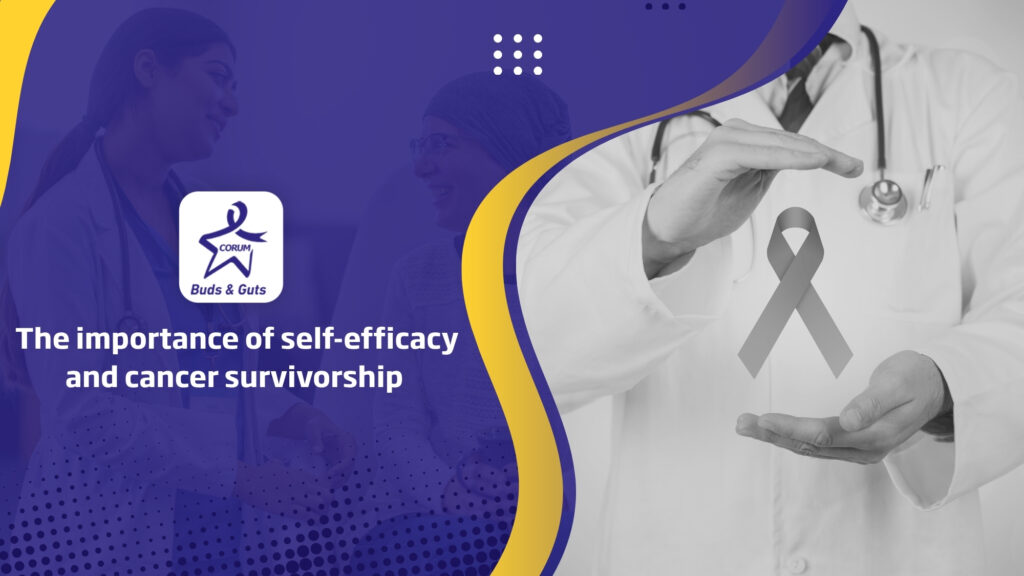
Cancer survivorship is a journey that extends beyond the psychological and physical effects of receiving a cancer diagnosis and treatment. It is a stage of life marked by physical recovery, emotional healing, and adapting to new ways of living. Survivors often face challenges such as fatigue, fear of recurrence, changes in body image, and uncertainty about the future. In the midst of these challenges, one powerful resource that helps survivors move forward is self-efficacy.
Self-efficacy, introduced by psychologist Bandura (1977), is the belief in one’s ability to manage situations and achieve goals. For cancer survivors, this belief plays a vital role in shaping how they cope, make decisions, and regain control over their lives. Self-efficacy also influences self-regulation, guiding how much effort is put into tasks, how long one perseveres in the face of difficulties, and how resilient one is to setbacks.
Research has consistently shown that higher self-efficacy is linked to better quality of life, improved emotional adjustment, and stronger adherence to health behaviours among cancer survivors. According to Foster and Fenlon (2011), survivors with stronger self-efficacy demonstrate greater confidence in managing symptoms, maintaining relationships, and returning to meaningful daily activities. Similarly, studies by Luszczynska et al. (2005) highlighted that self-efficacy contributes to positive health behaviours such as exercise, healthy eating, and stress management, all of which are vital for long-term well-being after treatment.
According to Bandura (1977), self-efficacy beliefs develop through four main sources of influence:
1. Mastery Experiences: Small successes like keeping a regular exercise routine or attending follow-up appointments, builds confidence and reinforce one’s capabilities.
2. Vicarious Experiences: Seeing and learning from the experiences of other survivors provides hope and encouragement to believe in one’s own capacity.
3. Verbal Persuasion: Supportive words from family, friends, and healthcare providers strengthen self-belief, especially when encouragement comes from trusted voices.
4. Managing emotional and physical states: Emotional well-being and physical recovery affect confidence. Managing stress and reducing distress improve self-efficacy, while heighted level can undermine it.
The role of self-efficacy in survivorship is not only about individual resilience but also about rebuilding identity and meaning in life. Survivors with higher self-efficacy are more likely to take an active role in decision-making, advocate for their own needs, and view challenges as opportunities for growth (Bandura, 1997). This perspective enables them to move from merely surviving to actively thriving.
Counselling plays an important role in strengthening self-efficacy. Counsellors help survivors set realistic goals, reframe setbacks and celebrate progress. They can encourage survivors with affirming words and guide them in managing emotional states through techniques such as mindfulness and Cognitive Behavioral Therapy (CBT). These approaches have been shown to improve confidence and coping among cancer survivors (Foster & Fenlon, 2011; Luszczynska et al., 2007). In this safe and supportive space, survivors learn to believe in their ability to manage challenges and embrace life with renewed purpose.
Self-efficacy empowers survivors to take charge of their recovery. Small, supported steps create momentum toward greater control and resilience. Applying Bandura’s theory can improve emotional and physical well-being. Survivor voices are central to this journey. Hearing another survivor say, “Seeing others thrive gave me hope that I could as well.” helps create connection and shared strength. Storytelling connects survivors to one another, offering strength and reminding them they are not alone. Self-efficacy grows through these shared experiences, building courage to live fully beyond cancer.
You are stronger than you think. Believing is the first step.
About the author: Janie Lim is a trainee counsellor currently pursuing a Master of Counselling at Open University Malaysia. She is also a Stage 3 colon cancer survivor, bringing personal insight, empathy, and hope to those navigating similar journeys. Drawing from her lived experience and professional training in Person-Centered Therapy, Cognitive Behaviour Therapy (CBT), and Solution-Focused approaches, she supports individuals in managing emotional distress and building resilience. Her passion lies in serving and advocating for the cancer community and underserved groups, creating safe and supportive spaces for healing and hope.
References:
- Bandura, A. (1997). Self-efficacy: The exercise of control. W H Freeman/Times Books/ Henry Holt & Co.
- Bandura A. (1977). Self-efficacy: toward a unifying theory of behavioral change. Psychological review, 84(2), 191–215.
https://doi.org/10.1037//0033-295x.84.2.191 - Foster, C., & Fenlon, D. (2011). Recovery and self-management support following primary cancer treatment. British journal of cancer, 105 Suppl 1(Suppl 1), S21–S28.
https://doi.org/10.1038/bjc.2011.419
- Luszczynska, A., Sarkar, Y., & Knoll, N. (2007). Received social support, self-efficacy, and finding benefits in disease as predictors of physical functioning and adherence to antiretroviral therapy. Patient education and counseling, 66(1), 37–42. https://doi.org/10.1016/j.pec.2006.10.002
●Luszczynska, A., Scholz, U., & Schwarzer, R. (2005). The general self-efficacy scale: multicultural validation studies. The Journal of psychology, 139(5), 439–457.
https://doi.org/10.3200/JRLP.139.5.439-457
